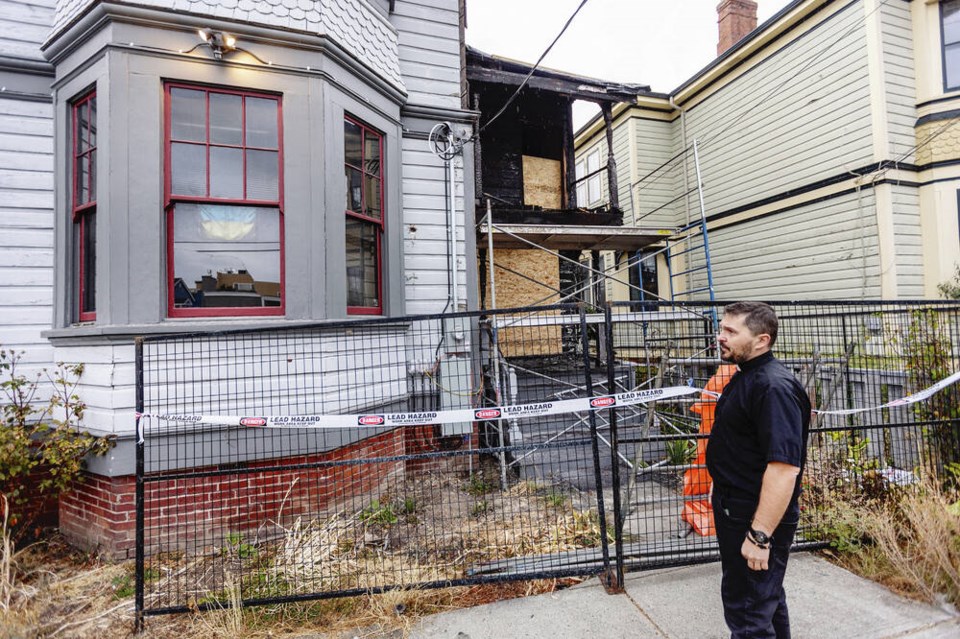Six months after the fire, Father Yuriy Vyshnevskyy wants to move on.
Dwelling on the unsolved arson attack won’t help his three young children mend, he says.
Also, he wants to keep the focus on his ministry at Victoria’s Ukrainian-Catholic church, its congregation now dotted with war-weary refugees. Being seen as The Priest Whose House Was Burned detracts from that.
Still, it’s hard to just lock this away in some box at the back of his mind, particularly with the questions of who set the Vyshnevskyy family’s Caledonia Street home ablaze, and why, still unanswered.
The crime remains shocking. Who would torch a priest’s house — anyone’s house — with his family inside? Yet that’s what happened. Around 1 a.m. on April 20, Vyshnevskyy, reacting to a disturbance by the front door, discovered flames.
With the help of a neighbour, he had to catch his three young children as they leaped from the second storey. His wife was pulled from a window ledge. In the scramble to escape the flames, their then-11-year-old daughter cut her arm badly on broken glass, severing a nerve. Surgeries were needed.
Six months on, the big questions remain. Who would do this? Was it a hate crime related to the war in Ukraine? Victoria police say the investigation is still active.
For the priest and his wife, the best-case scenario (if you can call it that) is that it was a completely random attack by a deranged individual. “We just want that person to get help,” he said Friday.
More troubling is the possibility that the attack was targeted. “We still don’t know who and why.”
The family lives in a different house now, one offered up by a Sikh group, the Khalsa Diwan Society. The old home, a heritage structure owned by the church, will be restored, but the Vyshnevskyys won’t move back in. “It’s going to be too hard for the family.”
The priest passes the fire-damaged structure every time he goes to the Ukrainian-Catholic Church of St. Nicholas the Wonderworker, which is next door at Cook and Caledonia. For the first couple of weeks after the blaze, he would sit in his parked car and stare at the house, its front entrance charred black, police tape straggling down the side, a soot-stained Ukrainian flag in the front window. These days, he barely gives it a glance while walking by.
“I’m trying to put this behind, as much as I can,” Vyshnevskyy said.
He and his wife believe focusing on the future is the best way for their children to get past what happened. If the kids raise the topic, fine, but otherwise they discuss other matters.
The younger ones, ages seven and five, do talk about the fire now and then, but mostly in relation to missing toys, that sort of thing. Some of their playthings were salvaged last week, but even after cleaning they still smell of smoke.
The eldest child, now 12, is getting better, but still has no feeling in three fingers.
To decorate the bedroom wall of her new house, she chose a picture of herself with the two Victoria police officers who “basically saved her life” on the night of the fire, Vyshnevskyy said.
What he doesn’t know is that one of the two officers was just a month out of the police academy. A VicPD specialist had just taught her how to tie the tourniquet that she used on the badly bleeding girl.
Vyshnevskyy is optimistic that his daughter’s physical wounds will heal. Only time will reveal if the children retain emotional scars, though.
All this comes in a year in which Vyshnevskyy, who emigrated from Ukraine 14 years ago, oversees a parish (and another in Nanaimo) that has seen an influx of newcomers from his homeland.
Enough of them have arrived that it has changed the way he conducts services. Before the war, his homilies were usually in English, with a summary in Ukrainian for some of the older congregants. “Now, basically, I repeat everything in Ukrainian.”
The arrivals are a fluid group, some taking root in Victoria, others stopping just briefly before finding a job or housing in another town. Some will go back to Ukraine if possible (“How many will have anything to return to when cities have been levelled to the ground?”) but right now they all need help settling here.
As Vyshnevskyy speaks, a Ukrainian mother of four enters the church. The five of them are living temporarily with a host family, but that can’t last forever. “Where’s she going to be in six months?”
That’s where his energy should go, he said. He turns 44 today. He wants to look ahead, not back.
“I want to talk about the fire less and less and less.”
>>> To comment on this article, write a letter to the editor: [email protected]



